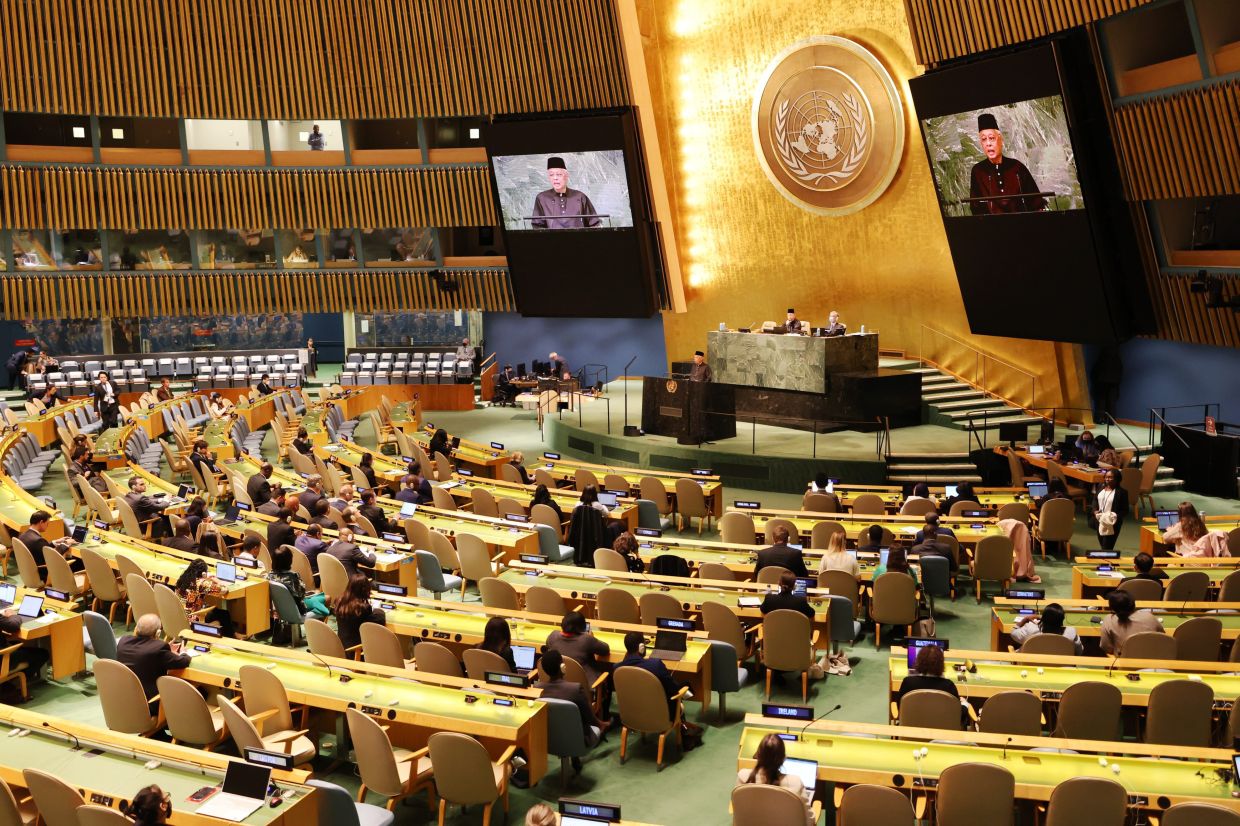DATUK Seri Ismail Sabri Yaakob yesterday (Sept 23) delivered the country’s national statement at the UN General Assembly (UNGA) in New York, US, in Malay, the first prime minister to do so in Malaysian history.
In his 20-minute speech at the 77th session of the UNGA, Ismail spoke on a number of matters – including the UN Security Council, Ukraine war, Rohingyas, Palestine and the need to address rising global inflation.
FocusM summarises the main points of the prime minister’s speech, based on on-the-ground reports by national newswire Bernama.
“UN Security Council veto power must be abolished”
Ismail called for the veto power of the powerful UN Security Council to be abolished, which he claimed is often “misused” to favour the world powers that have it.
“It is not democratic and violates the principles of democracy. This makes it impossible for conflicts to be resolved by any of the permanent members of the council,” he said.
He added that this is why conflicts and crises that occur in the world, including in Ukraine, Palestine and Myanmar, cannot be resolved – due to the “debility” of the global governance system and the UN.
He also pointed to such conflicts as reasons why the rest of the world is facing various problems, such as a lack of nutrients and food resources.
A case in point is the situation in Ukraine, which has seen a seven-month-long war with Russia. Ismail noted that the conflict has threatened peace, global security and the economy and undermined food security.
“Take in more Rohingya refugees, deal with Myanmar crisis”
Ismail also called on the rest of the world to take in more Rohingya refugees, saying it is their responsibility to allow them to be resettled in their respective countries following the crisis in Myanmar.

He also noted that although Malaysia is not a signatory to the 1951 Convention on the Status of Refugees and the 1967 Protocol, the country accepted nearly 200,000 Rohingya refugees on humanitarian grounds.
He again criticised the UN Security Council for “not taking any serious action” in dealing with the situation in Myanmar, saying they are seen as having washed their hands off and handing the matter over to ASEAN.
“Malaysia is also disappointed there is no meaningful progress in the implementation of the ASEAN Five Point Consensus (5PCs) by the Myanmar junta,” he added.
“In its current form, Asean’s 5PCs cannot continue any longer. Therefore, this consensus needs to be given a new lease of life and refined based on a clearer framework, time frame and end goal.”
Palestine
On the situation in Palestine, Ismail reiterated Malaysia’s long-held view that Israel is in the wrong over its “brutal occupation” of Palestine, which has caused Palestinians to suffer under the “shackles of Israel’s discriminatory policies.”
“Illegal settlements (in Palestine) are becoming more widespread,” he said. “This is against international law, including Security Council Resolution 2334. The most basic rights of the Palestinian people continue to be denied.”
He also pointed to the apparent double standards in the global response to Ukraine and Palestine.
“What is happening today is that most countries are so quick to act in the case of Ukraine. Malaysia wants the same action to be taken to resolve the issue of Palestine.”
Israel needs to stop being an “apartheid entity”, he added.
“Time for international monetary cooperation mechanism”
Meanwhile, Ismail proposed that the UN member countries establish an international monetary cooperation mechanism to address various economic issues, including rising global inflation.
Ismail said such a mechanism was necessary in view of the fact that in an interconnected world, the policies and decisions made by some countries can affect other countries too.
“For example, in tackling inflation, which has become a worldwide phenomenon, the monetary policy and setting of interest rates by one country would also have an impact on other countries,” he said.
He explained that the proposed establishment would create a more effective and just system that is capable of balancing the needs of global development, adding that cooperation and coordination between countries need to be improved to achieve equitable economic prosperity.
The World Bank has forecasted a global recession in 2023 and a string of financial crises in emerging markets and developing economies as a result of simultaneous hikes in interest rates in response to inflation. – Sept 24, 2022
Main photo credit: Bernama









